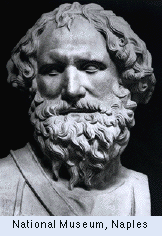Archimedes
Philospher and scientist; b. 290/280 BC (Syracuse, Sicily), d. 212/211 BC (Syracuse)
 Archimedes discovered and formulated the principle of buoyancy, also known as the hydrostatic principle or Archimedes' principle. Among his many inventions is the "Archimedes screw", a device consisting of a helical screw in a cylinder used to raise water.
Archimedes discovered and formulated the principle of buoyancy, also known as the hydrostatic principle or Archimedes' principle. Among his many inventions is the "Archimedes screw", a device consisting of a helical screw in a cylinder used to raise water.
Archimedes briefly visited Alexandria in Egypt, the intellectual centre of his time, but spent most of his life in his home town. He assisted it greatly against many Roman attempts to capture it, by inventing various war machines. Eventually the city was taken, and Archimedes was killed by a Roman soldier.
His various writings were well ahead of his time but did not influence the development of human knowledge until Arab civilization made his works known to medieval Europe. Amongst his most important writings are
- On the Sphere and Cylinder
- Measurement of the Circle
- On Floating Bodies
- Method Concerning Mechanical Theorems
Legend has it that just before his death Archimedes was studying geometrical problems and tried to fend off the approaching soldier with the words: "Do not disturb my circles!" If true it is another example of the preponderance of geometry in Greek mathematics - Archimedes certainly did not say: "Do not disturb my numbers!"
In his work On the Sphere and Cylinder Archimedes proved that the ratio of the volume of a sphere to the volume of the cylinder, as well as the the ratio of the surface area of a sphere to the surface area of the cylinder that contains it, together with its circular ends, is 2:3. The volume and surface area of a cylinder were known before Archimedes, so Archimedes was the first to establish the volume and surface area of a sphere.
According to Plutarch, who lived 45 - 120 AD, Archimedes requested from his friends and relations that his grave should carry a small monument of a cylinder containing a sphere that touches the cylinder walls. On the front should be written the ratio of the volumes of the cylinder and the sphere. Archimedes' grave did indeed carry such a monument when it was rediscovered by the Roman authorities of Syracuse in 75 BC, 137 years after his death.
home
 Archimedes discovered and formulated the principle of buoyancy, also known as the hydrostatic principle or Archimedes' principle. Among his many inventions is the "Archimedes screw", a device consisting of a helical screw in a cylinder used to raise water.
Archimedes discovered and formulated the principle of buoyancy, also known as the hydrostatic principle or Archimedes' principle. Among his many inventions is the "Archimedes screw", a device consisting of a helical screw in a cylinder used to raise water.